Athens into History, from the Agora to Exarchia, Delphi to Mycenae
Scurrying off our boat in Raffina, we jumped into a car to the city.
I sat in the front of the cab for the 20 minute ride to our hotel.
On our driver chatted about the city, about Athens, about Greece, about Germany.
It's much much better now than it was before, he said, referring to the financial crisis of 2009, when Greece was forced to accept tough financial terms for a bailout from Europe. Was Athens hit hard during the war, I ask, referring to World War II. Italy and then Germany attacked, says our driver, referring to the Greco Italian War of 1940, after the Italian invasion that October. Now we are friends, he says. Everybody forgets, he laughs. Now we are friends. A hint of irony. Germany once dominated Europe with tanks, now they do it with banks. When people retire, they don’t say they want to go to Germany, they come to Greece. That's what they want, to live here, with the great food and beaches and people. To bail out Greece, Germany and the EU exacted a cost.
Arriving, we see a thriving, bustling, raw city. People are out in cafes, drinking, smoking, dark corners and busy hubs, red lights and drug users. It's a modern city, but an ancient space. The battles here have been many. Herodotus wrote of the Battle of Marathon, the details of that invasion of 490 BC, 75 years after the battle took place in his Histories:"There fell in this battle of Marathon, on the side of the barbarians, about six thousand and four hundred men; on that of the Athenians, one hundred and ninety-two."
The stories of the Hellenistic era - endless, ebbing from the age of Alexander, 323 BC, the poets, the plays of Euripides and Sophocles, the philosophers, and the rise of the Roman era with the Battle of Actium of 31 BC. Layer after layer, myths blurring into questions about what is history, who won, lost, and at what cost.
“What you leave behind is not what is engraved in stone monuments, but what is woven into the lives of others,” wrote Pericles.
Each street or monument, another story.
We go next door to get a drink at a lonely bar by the hotel, a cabaret and brothels down the street. The amiable bartender tells us stories of the non gentrified city, its queer spaces, and many struggles. We eat at a lovely little night cafe, seats piled into the streets, where people are out talking, drinking wine.
And get some sleep.
Relics seem to be everywhere, even on our metro stop on the way to the Acropolis, our hike up to the Pantheon, Herod Atticus Odeon. Up we climb, it's almost like heaven, a world on top of the city, with a view, a story of the commons, a Roman Agora and Ancient Agora and Temple of Hephaestus, ever majestic. Public space for the people. I feel ready to philosophize here, dialogues with the ages, into the night.
Piss on cops, declares the graffiti on our walk the next day. On to Exarchia, punks and counterculture, anarchists and socialists, intersectional feminist book clubs, and battles over what the city will become. You see it in the writing on the walls, on the streets. Riot cops stand around, enforcing park restrictions. Parks closed today, says one supporter. The cops kicked everyone out of the park and beat them. Occupation lasted a month. And then the cops moved in with violent arrests. Streets stay wild. Fight cops not drugs, says the spray paint. The police didn't seem that interested in the people having access to Exarchia square. A monument to the homeless. Monuments to Athena and other women. The city is alive. I ask the proprietor at Rhythm Records, a punk shop on Emmanouil Benaki, what is going on. He says no one here wants the train station stop they are planning, on the square. And plays us local punk records.
“Residents of Athens’ historic Exarchia Square resist metro station plan,” says the article in the Guardian. “Protesters say station is part of gentrification scheme aimed at altering historically leftwing area.” The struggle for public space extends in countless directions, with openings and restrictions, from Charas El Bohio, in the Lower East Side of Manhattan, to Gezi Park in Istanbul, where the cops block access.
Into the afternoon, we strolled, finally gaining entrance to the Archaeological Museum. All my life I've studied these layers of history... Mycenaean to Classical Greece to Rome. Cycladic figurines open a way of looking at bodies and shapes, whimsical silhouettes of humans, children, round, adults as youthful, playful motifs Picasso and Miro would borrow to create a modern image, new and old, dancing through time. So much here, poems and philosophy merging between ancient and modern culture.
We explore to junk shops and thrift stores, bookstores, a small bar whose bartender makes lovely Old Fashioned cocktails, in a perfect blend of sugar and bitters, whisky and orange peel. Past an orthodox church, looking at the Acropolis, we find our way Plantanos, to a beloved mom and pop place, Irwin told me about. All day into the night Exarchia to Plantanos Taverna back to the Roman Agora and back to Exarchia for late night Greek music. The streets are filled with people.
Drug users sleep in the streets, cops everywhere doing nothing to help. Athens needs harm reduction, not cops. Still people are out listening to music, talking all night. Anarchist slogans everywhere; communist propaganda. Be gay, do crime, says one mural. A woman was killed here, says another.
Greece is not Europe, our bartender told me. He is a physics student studying the climate. People come into the bar asking for help. He's happy his bars a place for that. We talk about the red lights, people walking to and from into the basements, up the stairs, where workers get ten euros a date, sometimes nothing, just a place to sleep. Sad, he says. Tragic. What a tragic, gorgeous city. We chat late into the night.
Strange saying goodbye to Athens a few hours after going to bed. The sun dances in the sky, overlooking the city. I swim on the roof of the hotel.
Driving away, it's not simple, getting out of the modern ancient metropolis, on the way to Delphi, where the oracle spoke for the gods a long long time ago. But did she?
I think about these old stories of gods and heroes, myths of order dueling with chaos, logic countered by inebriation, organization vs control, logic countending freedom of thought, the clashes helping us describe the universe and consciousness, even if it does take shape and the birth of tragedy. So much is here if we look long enough. As a kid, we read the D'Aulaires' book of myths, stories of jealousy and desire and deception. It helped us look at the world. It reminded us to watch out for hubris. Be humble. We loved the stories of the gods. The last page of the book suggests the gods eventually disappeared. Their worlds just memories and stories we'd read of in Sophocles and Homer, tragedies and comedies and poems, ways of thinking, looking at the ruins of the old temples of Apollo and Athena.
Each day, another ruin, another beach. Onward through the legends of Mycenae, the treasury of Atreus, the Tomb of Agamemnon, the citadel, dating back some 15,000 years, the stories of the wrath of the gods, endured by his descendants, the stories we read about at Greenhill. The lessons of tragedy, the suffering into truth. I remember Bobby Kennedy read the Oresteia after losing his two older brothers. We learn a lot when we come to embrace the tragic sense of life, seeing them, learning about them.all with my family, teaching us like the Mayan temples in Mexico and Angkor Wat in Cambodia.
Caroline finds us a room in Nafplio, a former capital on the water, with the cats.
We drink lovely wine before our last day on our journey through islands and myths.
Small boats moored along the waterfront, the small cats remain.. And we find the remains of Temple of Poseidon. A dog leads to an ancient Roman Bath, with mosaics to Poseidon at Isthmian Archaeological Museum. An amphitheater sits to our right, half excavated, mostly in the dirt. The archaeologists are gone. No more digging here. Just our tour guide, running through the ruins, ending our week of exploring ruins.
Off to Hotel Cokkinis, a beach hotel, with a quiet restaurant overlooking the Saronic Gulf.
It's the warmest water of the trip, majestic and dreamy.
On we swim, thinking about the ruins of Corinth, the curse of Agamemnon, the ancient roman baths, the Greek Agora, the cats of Tinos, the new friends in Nafplio; Orion lights up the night sky and the stars.
The teenager reads us e a few of their own verses, stories of longing and history and family myth, combined into epic narratives.
Not so little now.
I'm reading Faustus, the teenager almost done with One Hundred Years of Solitude.
Keep looking for the chapter about the bananas, I say.
Dad I finally got to that part, they tell me on the flight back to Berlin.
Mythic time vs modern logic, whirl through the stories.
My mind drifts back at Ulysses.
"I cannot rest from travel: I will drink
Life to the lees: All times I have enjoy'd
Greatly, have suffer'd greatly, both with those
That loved me, and alone, on shore, and when
Thro' scudding drifts the rainy Hyades
Vext the dim sea: I am become a name;
For always roaming with a hungry heart
Much have I seen and known; cities of men
And manners, climates, councils, governments,
Myself not least, but honour'd of them all;
And drunk delight of battle with my peers,
Far on the ringing plains of windy Troy.
I am a part of all that I have met;..."
Bye Greece.
We will miss you. Hopefully it's not 21 before we see you next. Thanks for the constellations. Thanks for the stars. Thanks for the dreams. Thanks for Calypso.





































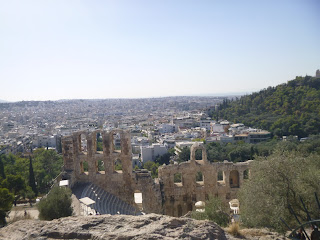




















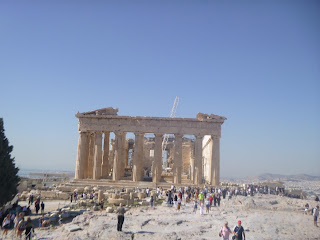
























































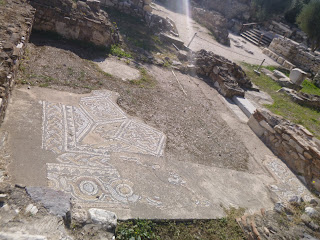





























































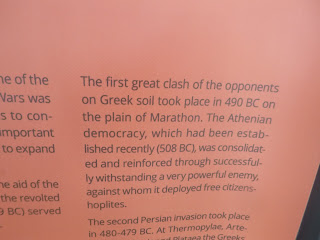


















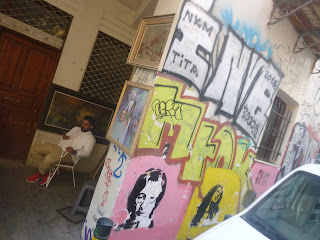

















































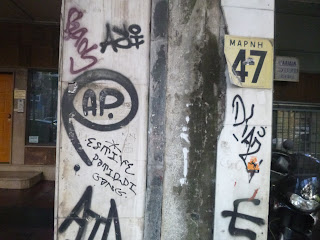















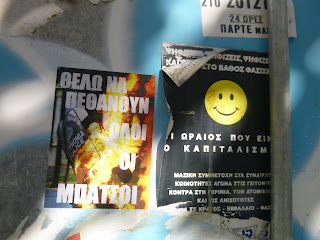



















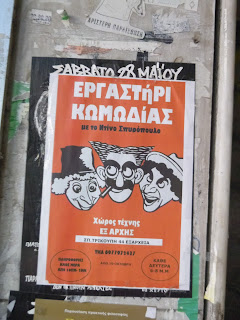

























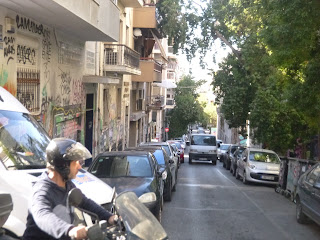














































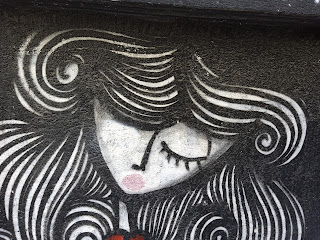

















































































































































































No comments:
Post a Comment